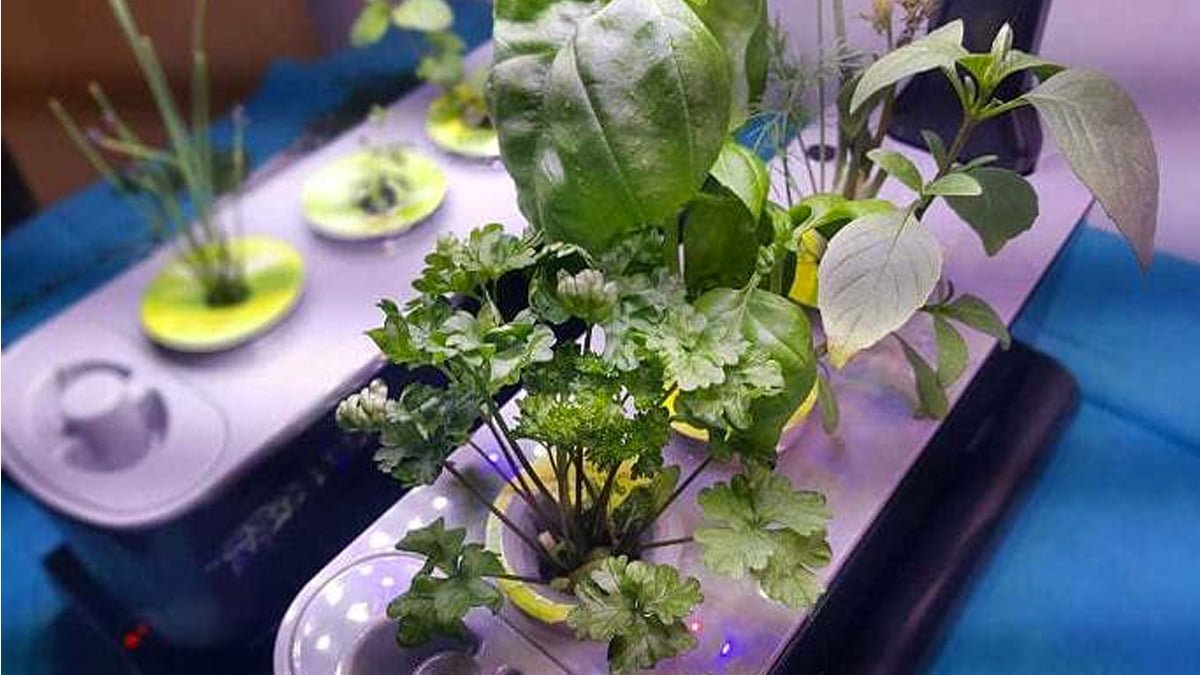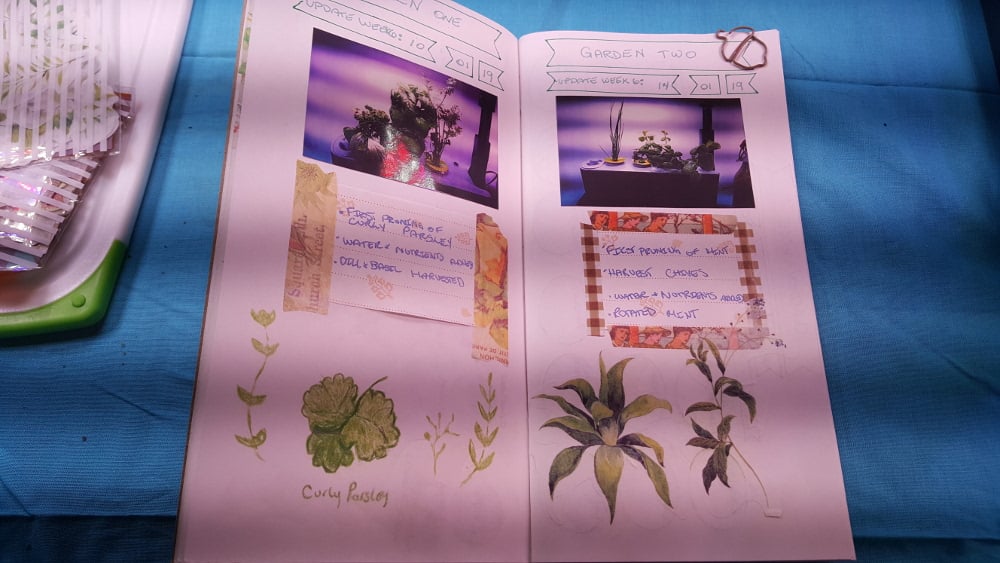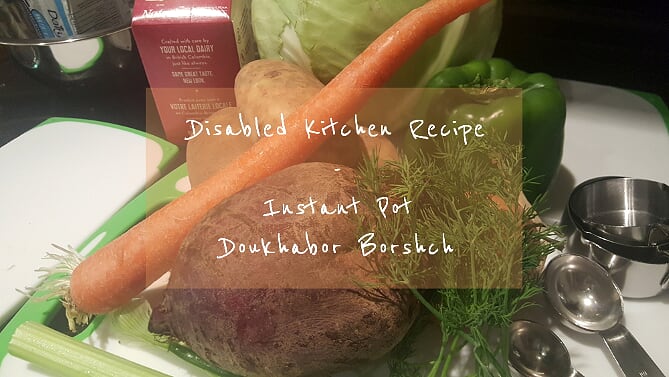 GeekDad Jules has a new project, Disabled Kitchen and Garden, a blog dedicated to educating people about cooking as a disabled person. It’s a unique site with a clean and fresh look that is welcoming to all that visit. I had the chance to interview Jules about his new project and here is what he had to say.
GeekDad Jules has a new project, Disabled Kitchen and Garden, a blog dedicated to educating people about cooking as a disabled person. It’s a unique site with a clean and fresh look that is welcoming to all that visit. I had the chance to interview Jules about his new project and here is what he had to say.
GeekMom: Could you give us a brief overview of what Disabled Kitchen and Garden is all about?

Jules Sherred: At its most basic, Disabled Kitchen and Garden is an #OwnVoices disability blog that focuses on cooking and gardening but more specifically, Instant Pot-ting and AeroGarden-ing. I created it after getting increasingly angry and frustrated over the fact that whenever I would search for disability-related kitchen and garden things, the search results were useless. They were all written by abled people for the disabled, filled with things that were very unrealistic and ableist. I couldn’t find a single site that was written for the disabled by someone who is disabled.
Some specific examples of when it comes to the kitchen and cooking are “easy” Instant Pot recipes that say it takes 10 minutes to prep but, in reality, for someone who is disabled, it takes an hour. Then to add insult to injury, there are way too many steps and it would take less time to cook it on the stove. The whole point of the Instant Pot is that it’s supposed to reduce time spent preparing meals.
Then, there is the fact that most of the recipes are rubbish because the writer doesn’t understand the science behind the Instant Pot and cooking under pressure. So, the recipes call for too much fluids which makes for bland recipes; call for things like pre-browning meat when you don’t need to because of how the Maillard reaction works when cooking under pressure; the cook time is way too long; the ingredients are either things not available if one lives in a food desert or they are way outside of a disabled person’s budget.
Also, there are people criticizing things like plastic straws, pre-peeled oranges and garlic, and more, each of which are essential needs for certain types of disabilities. Without those items, many disabled people are excluded from drinking or eating those items.
The straw that broke this camel’s back was after I purchased my AeroGarden Farm Plus. Before purchasing it, I did a lot of research and read a bunch of reviews. There are some amazing accessibility features on the Farm Plus that were dismissed as frivolous or just a shiny tech add-on. Also, the reviews didn’t include essential information people with mobility issues need to know before purchasing a Farm Plus.
So, Disabled Kitchen and Garden was born. It’s important to have #OwnVoices blogs on these topics to make sure the content is realistic and useful, is healthy, fits within one’s budget and isn’t advice from an abled person who likes to offer advice without understanding various barriers.
GM: Do you find that writing the blog is cathartic for yourself and your disabilities knowing you’re putting something good out there for others?
JS: I’m not sure cathartic is the right word, even though I do find it very therapeutic. It’s mostly rewarding because I’m creating a much-needed resource for other disabled people. This is something that is sorely needed and long overdue. It’s also frightening because the disabled community faces a lot of backlash whenever we are open and honest about the barriers we face. We get called lazy at best and I’m not even going to mention the worst. We get so much unsolicited, and often dangerous, advice from able-bodied people who have no understanding of why their suggestions are harmful and ableist.
The therapeutic part comes through the sharing. I have Complex-Post Traumatic Stress Syndrome (C-PTSS) and it requires a big leap of faith to put trust into others that they won’t harm me for sharing these things. Part of my C-PTSS comes from medical neglect as a child. I’m in regular trauma therapy. One of my homework exercises is to openly talk about these things and trust that there will be people who want to support me through managing my disabilities and having those supports will help me through coping with those people who would rather be ableist in their reactions. So far, the feedback has been overwhelmingly positive and is helping to rewire that part of my brain through positive reinforcement.
GM: What is the most important thing you want people to know about this new project and what it means to you?
JS: That a safe community is forming around this blog. One of my goals was to create a safe and inclusive space for other disabled people to share their own tips and tricks, either in the comments on posts or via social media. We don’t share enough because of the backlash we face when we do. It’s vital that we do share and don’t have to figure it all out on our own. I have a post with 11 essential items for a disability-friendly kitchen. Each item, I had to discover on my own. I would have had a much easier time cooking if another disabled person had only told me about these items years ago with the exact reasoning as to why these items are essential.
This community is already forming. I’ve received some extremely helpful tips in the comments on various posts and on Twitter. Soon, there will be another post with more essential items, with credit to those who were brave enough to share in return.
GM: Where do you get your recipes, like Instant Pot Effin Good Chili?
JS: Except for the Doukhobor Borshch recipe which is an adaption for the Instant Pot, every recipe is of my own invention. They each include ingredients that are easily sourced, are affordable and are healthy. They are all mostly dump and cook recipes that have tips for decreasing prep and cooking time. Most recipes can be frozen, and I have a few recipes that are perfect for canning if one has the spoons for canning and doesn’t have a lot of freezer space. The site is still new, so there isn’t a huge inventory of recipes yet, but I have a bunch of recipes planned.

GM: How did you get into AeroGarden-ing and what benefits has it given you emotionally and physically?
JS: About a year ago, the AeroGarden and Click and Grow came onto my radar. The science behind both fascinated me and they’re fool-proof. Also, I always wanted to grow my own herbs and fruits, but I not only have a black thumb, I don’t have the space or physical ability for outside gardening, or the spoons for inside potted gardening. So, I spent a lot of time researching the differences and reading reviews.
As I was learning more about both products, savings also became a factor. Living in Canada means certain produce is very expensive, especially in the winter when things are imported from the United States. The more north you live, the more expensive these items get. Currently, a single sweet bell pepper costs $2.50 where I live. Same for a tomato. That equals $20.00 per week for four of each in the winter. These items are one of many staples in my kitchen. The cost of growing these items is less than $10.00 per plant per year. If you tend to your fruits correctly, they will produce for more than one year. Herbs will produce for more than six months.
I went with the AeroGarden because it’s more versatile than the Click and Grow, the plants live longer and produce more, and you can buy more AeroGarden-related things in Canada than for the Click and Grow. It simply made financial sense.
So, physically, the benefits are the ability to continue to eat healthy without having to spend a fortune. Plus, the ability to tend to a garden while sitting down and in less than five minutes each week.
AeroGarden-ing has also helped to treat my psoriasis, on top of the disease-modifying drugs I’m on. But I need to balance those benefits with the fact I’m allergic to UV by limiting my time with my gardens. No treatment in over 40 years has worked to clear it on my face and scalp.

The emotional and mental health benefits are many. It’s been very therapeutic. You get the same mental health benefits from AeroGarden-ing as physical gardening but without the pain. You get rewards from seeing the fruits of your labor. It reduces stress. The lights on the AeroGarden are full-spectrum, so it helps with a variety of mood conditions, especially in the winter. I’ve created another Midori journal to track my gardens, which also has mental health benefits. And it helps lessen my anxiety which is caused by a variety of things, especially the anxiety I get when my C-PTSS is triggered. When triggered, all I need to do is walk into my garden room, sit in my chair, and enjoy the sights, smells and sounds of my gardens to ground me and bring me back to what is happening right now and reaffirm that I’m in a safe place, instead of running a million what-if scenarios.

GM: Do you have a favorite recipe that you’ve posted?
JS: So far, my favorite recipe that I’ve posted is the Instant Pot Doukhobor Borshch recipe. Most people are completely unfamiliar with this type of Borshch. It’s a family recipe and a comfort food that takes close to four hours to cook on the stove, but I’ve reduced that time significantly. That said, I have a Butter Chicken recipe coming up that is a tie as my favorite recipe. I also have the best roast chicken you’ll taste recipe coming up. The roast chicken recipe will be one of the very few non-Instant Pot recipes but still requires very little labor.
GM: What have you learned from AeroGarden-ing?
JS: I think the biggest thing I’ve learned from AeroGarden-ing is that it truly is just as valid as the getting-your-hands-dirty type of gardening. Many gardening benefits posts will tell people that the only way to get all the physical and mental health benefits of gardening is through the type of gardening that involves dirt and fresh air. My trauma therapist told me that simply isn’t true. I trust her with my life, but I’m always skeptical of these sorts of things until I do it and see for myself. Of course, she was correct. I was expecting it to be easy and pain-free, but I was not expecting the mental health benefits to be so big and so immediate. The treating of my psoriasis for the first time in over 40 years was just a really nice surprising bonus!
Follow Disabled Kitchen and Garden on Twitter and Instagram!
A Note About PTSS vs PTSD
PTSS is what PTSD is called now. It was supposed to be updated in the DSM V, but it wasn’t included in time. However, all professional psychiatric and psychology associations call it PTSS, both in treating patients and in official treatment guidelines and literature.
Post Traumatic Stress is not a disorder. Someone isn’t disordered because of the way their brain reacts post-trauma. It is a syndrome and perfectly logical reaction to trauma designed to protect oneself. Using the word “disorder” adds stigma.
If you were to use PTSD with an actual trauma therapist (someone who spent years going to school to specialize in trauma and does trauma therapy almost exclusively), they will quickly correct you if you were to use PTSD. Just sharing for information and so that people reading this can help reduce stigma around PTSS by being mindful of the language you use.
PTSS is on the schedule for formal inclusion the DSM VI.



